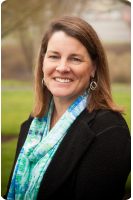Welcome
Welcome to the Aquatic Ecology Laboratory at Washington State University! We are located on the WSU Vancouver campus, in the Portland (OR)-Vancouver (WA) Metropolitan Area.
Co-directors Dr. Stephen M. Bollens and Dr. Gretchen Rollwagen-Bollens are both broadly trained in biological oceanography and aquatic ecology, with a shared interest in the biology and ecology of phytoplankton, zooplankton and fish in marine, estuarine and freshwater ecosystems.
In the AEL, our research spans the sub-disciplines of behavior, population biology, community ecology and ecosystem dynamics. Our research often has an applied aspect to it, touching upon such areas as conservation biology, restoration ecology, fisheries oceanography, and global change. We also employ a wide variety of approaches to “doing science,” including field (observational), modeling and experimental techniques. Overall, the AEL supports a highly collaborative and diverse research team consisting of graduate students, undergraduate researchers, research technicians and high school science teachers conducting summer research.
**Our group is committed to supporting the professional development of diverse students in aquatic science, with a focus on equity and inclusion in all aspects of our research, collaboration, and mentoring.**
As co-leaders of the AEL, Dr. Bollens and Dr. Rollwagen-Bollens have distinct, yet complementary, expertise in aquatic ecology; therefore, each leads the AEL along separate research threads that align with their specializations, while supporting the advancement of the entire AEL research program.
Harmful Algal Bloom Dynamics & Pedagogy to Increase STEM Student Success (Gretchen Rollwagen-Bollens, Lead) I am interested in the biotic and abiotic factors that influence the dynamics of harmful algal blooms in freshwater, estuarine and coastal ecosystems, with a particular emphasis on the role of grazers. We have examined algal blooms in freshwater lakes across a gradient of trophic state throughout the lower Columbia River Basin, and have begun a large, interdisciplinary study funded by the NSF “Dynamics of Integrated Socio-Environmental Systems” (DISES) program to investigate the reciprocal feedbacks between differing dam management strategies and harmful algal blooms in reservoirs of the Columbia and Willamette River systems. We have also maintained a long-term (15+ years) field and experimental research program in Vancouver Lake, WA, that is serving as a model system for understanding cyanobacteria bloom dynamics in shallow temperate lakes. In the area of science pedagogy, we are funded by the HHMI “Inclusive Excellence 3” program to collaborate with faculty from 15 university-community college teams across the US to test the effectiveness of strategies to lower systemic barriers for students along the transfer pathway to a BS in STEM.
Ecology, Behavior and Impact of Aquatic Invasive Species (Stephen Bollens, Lead) Our research in this area ranges from observational studies of invasive species abundance, distribution and composition in critical freshwater and estuarine habitats of the Pacific Northwest, to experimental programs to investigate the ecological interactions among native and invasive taxa, with particular focus on the impacts of invasive species on at-risk and economically valuable fish and invertebrate species (i.e. salmon and shellfish). We are currently focusing on the relationship of reservoir management in both “storage” and “run-of-river” dam systems on the presence and impacts of invasive zooplankton, through the NSF DISES-funded project. We are also collaborating with the Confederated Tribes of the Umatilla Indian Reservation (CTUIR) and the USGS Columbia River Research Lab to investigate the distribution and potential interactions between native and invasive bivalves in the Columbia River.
Our projects in the AEL have been funded by a wide range of federal and state agencies, including the National Science Foundation (NSF), the Environmental Protection Agency (EPA), the Office of Naval Research (ONR), the National Oceanic and Atmospheric Administration (NOAA), the United States Geological Survey (USGS), the Bureau of Indian Affairs (BIA), the Pacific States Marine Fisheries Commission (PSMFC), and the CALFED Bay/Delta Program.
For more detailed information on our current and recent research projects, please visit our Research and Publications pages
Co-Directors


**NEWS**
Fall 2024: Applications now being accepted for MS Assistantship in Feeding Ecology of Native Freshwater Mussels in the Columbia River to begin in Fall 2025!! Priority deadline January 10, 2025.
Also, NSF-funded “Rivers, Watersheds, and Communities in the Columbia River Basin” National Research Trainee program accepting applications for the 2025-26 academic year, with deadline of November 7, 2024. See link for information and to apply: https://nrt-rwc.wsu.edu/how-to-apply/
Summer 2024: We welcome another new graduate student, 2 undergraduate assistants and 1 new Murdock Partners in Science high school teacher!
Summer 2023: AEL welcomes one new graduate student, and 4 undergraduate summer interns and technical assistants!
Summer 2022: Aquatic Ecology Lab welcomes three new graduate students!
Spring 2022: Six (6) new publications from the Aquatic Ecology Lab! Check them out under Lab Publications!
Winter 2022: Dr. Bollens and Dr. Rollwagen-Bollens (and 4 collaborators from WSU Vancouver and WSU Pullman) have received a new 4-year NSF award to investigate the reciprocal dynamics of how management of dams western WA and OR influences greenhouse gas emissions, harmful algal blooms and aquatic invasive species in reservoirs, and how those biophysical outcomes may influence future dam management, specifically the use of discretion by dam managers.